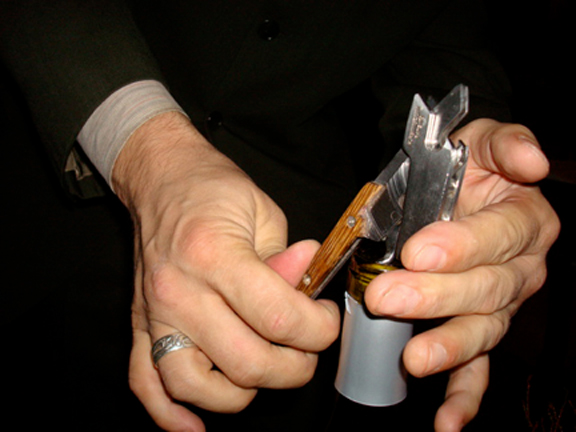
Can a Sommelier Be Trusted?
I’m just going to cut to the chase here.
Paul Sullivan’s ridiculous “Wealth Matters” column (“Reading Restaurant Wine Lists, for Blockbusters and Values”) for the New York Times this week really pissed me off.
In the article, he observes and asks: “At the end of the day, though, the sommelier is a salesman. Can he be trusted?”
Let’s disregard the inherent chauvinism of his rhetoric. Yes, it’s true that for many generations, men dominated cellar management in restaurants in the U.S. and Europe. Today, many of the country’s leading sommeliers are women.
Would Sullivan have asked such an offensive question if he’d visited enough US restaurants to discover that the patriarchal world that he cherishes, covets, and champions is rapidly disappearing? Probably not.
Beyond Sullivan’s latent misogyny, his misplaced and misinformed attitudes about sommeliers are a reflection of his manifest misanthropy.

It reminds me of my great uncle Ted, who was so convinced that every waiter was trying to rip him off that he often contested bills that were perfectly correct. If he didn’t make a fuss, he believed, he wasn’t getting his money’s worth. He’d get so worked up every time he took me out to dinner when I was in college at U.C.L.A. (he was a successful Beverly Hills commercial realtor), I wondered if he enjoyed going to restaurants at all.
And that brings me to my point: If you have to ask a question like Sullivan’s, don’t bother going to restaurants in the first place.
As one of the country’s top sommeliers, Bernie Sun, reminded the readers of EaterNY a few years ago, “it’s a business.”
When you enter a restaurant, you are tacitly acknowledging that you intend to engage in a business transaction. In other words, you are planning to spend money there and you broadcast that information to all those around you when you set foot in a restaurant.
The sommelier is there to help guide you to the best bottle for your meal. But they’re also there to help the business turn a profit.
That doesn’t mean that they’re trying to rip you off. Nor does it mean that s/he’s there to help you find the greatest value.
In an ideal world, they’re there to create a pleasurable and memorable experience with wine.
The same holds for your server. When a waiter tells you the restaurant’s daily specials, they’re is making you aware of some of the venue’s most lucrative offerings.
“In the mood for lamb? Or perhaps the giant scallops?”
After all, one — although not the only — reason we visit restaurants is to indulge.
The most important thing to keep in mind when you order a bottle of wine at a restaurant is that you should consider how much you want to spend before you sit down. Don’t be embarrassed — by any means! — to share that figure with your sommelier or server.
And if that person is talented at what they do, they will deliver a pleasurable and memorable wine within the parameters you have established.
I can only feel sorry for Sullivan. He must be such a sad man.
Can he trust his dry cleaner? Can he trust his doctor? If he’s worried about his sommelier, then I can only imagine what he thinks about his psychotherapist.
The bottomline is, if you treat your server/sommelier with respect, it’s more likely than not they will treat you with respect. That’s human nature.
Opening the dialog with mistrust only opens the door to an unpleasant experience.
May uncle Ted rest in peace.
Jeremy Parzen
follow Jeremy @DoBianchi